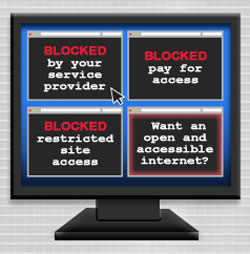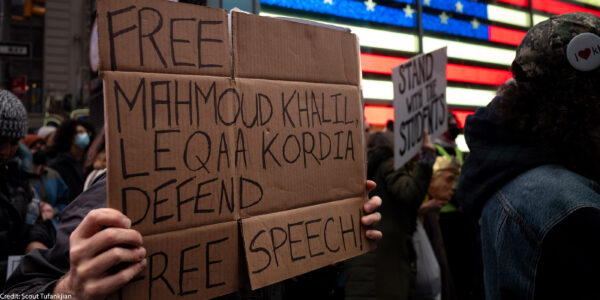
Today, Federal Communications Commission (FCC) Chairman Julius Genachowski proposed a new rule that clarifies the FCC's legal authority to enforce net neutrality principles. This new authority would prohibit network owners — usually telecom companies like Comcast and Verizon — from discriminating against information by throttling, slowing or otherwise tampering with the transfer of any data.
Sounds good, right?
Unfortunately, while the new rule calls for full net neutrality protections for the wired Internet, wireless Internet service will get less protection, and the rule will allow Internet service providers to charge wireless customers varying rates for different services. This false distinction between wired and wireless Internet is weird…and bad.
Cyber-law expert Marvin Ammori posits this scenario without wireless net neutrality:
[…]Sprint Wireless could discriminate against, say, Skype, degrading it to make it less reliable–so long as they don’t block it. Outside voice or video, anything is fair game. AT&T Wireless could make its own social network load faster than Facebook, or could make Fox News or MSNBC load faster than CNN or BBC, based on payments. While Skype, Facebook, and Fox News could maybe fend for themselves, innovative start-ups will be unable to reach wireless users without permission from gatekeepers like AT&T.
Additionally, today's rule would not reclassify broadband service providers as telecommunications services — what the ACLU and many of our net neutrality allies have been calling for all along. Congress defines a telecommunication service as: “The transmission, between or among points specified by the user, of information of the user’s choosing, without change in the form or content of the information as sent and received.”
Sound familiar? That's basically how the Internet works now (with notable exceptions, of course). No meddling middleman mucking up the works. But without reclassifying broadband services as a telecommunications service and thus putting net neutrality protections on a sound legal footing, we can't be certain the status quo will remain.
We at the ACLU are sometimes asked why we even care about net neutrality. But think about it: we're big free speech champions. And today, it is pretty much impossible to get through life without using the Internet – so it's essential that Americans' free speech rights are protected both on- and offline.
We still have some ways to go to preserve free speech on the internet. The five FCC commissioners will meet on December 21 and vote on this new rule. Stay tuned!
Stay informed
Sign up to be the first to hear about how to take action.
By completing this form, I agree to receive occasional emails per the terms of the ACLU's privacy statement.
By completing this form, I agree to receive occasional emails per the terms of the ACLU's privacy statement.

